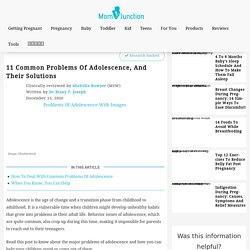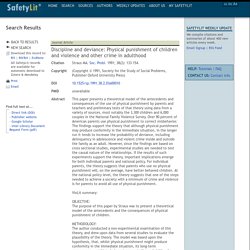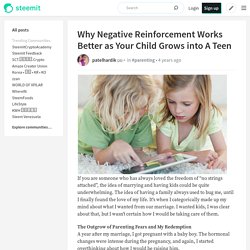

During adolescence (teenage children age between 13-19), parents face challenges to guide their children along due to physical, mental, and emotional changes in them. The following resources explain how parents can apply reinforcement and punishment to influence their teenage children in their behaviour. 11 Common Problems Of Adolescence, And Their Solutions. Adolescence is the age of change and a transition phase from childhood to adulthood.

It is a vulnerable time when children might develop unhealthy habits that grow into problems in their adult life. Behavior issues of adolescence, which are quite common, also crop up during this time, making it impossible for parents to reach out to their teenagers. Read this post to know about the major problems of adolescence and how you can help your children avoid or come out of them. How To Deal With Common Problems Of Adolescence Adolescence is not an easy time for children or parents. What are Operant Conditioning? Different types of operant conditioning.
Discipline Kids Who Ignore Consequences. Does your child ignore every consequence you give him?

James Lehman can help with 10 specific ways to make consequences work—even for the most resistant child. When kids are faced with something unpleasant, they’ll often act like it doesn’t matter to them. 10 Strategies for Dealing with a Defiant Teen. Adolescence can be a difficult phase in life to navigate.

Defying the wishes of their parents (or other authority figures) and testing limits is a normal part of growing up for teens. Youth are trying to figure out who they are, establish their independence, and express themselves. Unfortunately, in some teens, this process can cause them to act out in an angry, argumentative, spiteful, or rebellious manner. SafetyLit: Discipline and deviance: Physical punishment of children and violence and other crime in adulthood. This paper presents a theoretical model of the antecedents and consequences of the use of physical punishment by parents and teachers and preliminary tests of that theory using data from a variety of sources, most notably the 3,300 children and 6,000 couples in the National Family Violence Survey.

Over 90 percent of American parents use physical punishment to correct misbehavior. The findings support the theory that although physical punishment may produce conformity in the immediate situation, in the longer run it tends to increase the probability of deviance, including delinquency in adolescence and violent crime inside and outside the family as an adult.
Why Negative Reinforcement Works Better as Your Child Grows into A Teen. If you are someone who has always loved the freedom of “no strings attached”, the idea of marrying and having kids could be quite underwhelming.

The idea of having a family always used to bug me, until I finally found the love of my life. It's when I categorically made up my mind about what I wanted from our marriage. I wanted kids, I was clear about that, but I wasn’t certain how I would be taking care of them. The Outgrow of Parenting Fears and My Redemption A year after my marriage, I got pregnant with a baby boy. Conclusion.